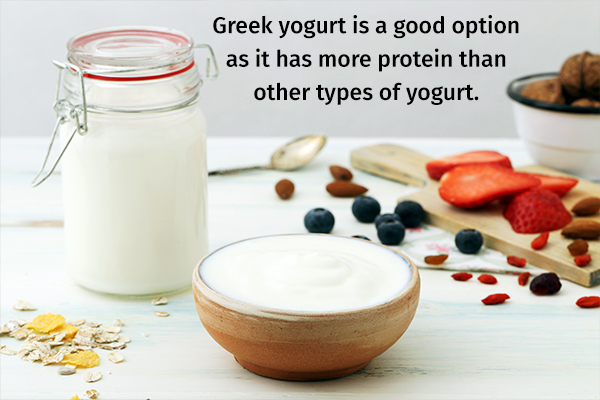In this article:
Yogurt comes in an array of flavors and preparations. Between low fat, fat-free, fruited, flavored, plain, Greek, and traditional — the choices can be overwhelming.

In both traditional yogurt and Greek yogurt, bacteria cultures help break down lactose, so yogurt is sometimes an easy dairy food to digest for those who are lactose intolerant.
Greek yogurt is strained and also has double the protein of traditional yogurt, but with reduced calcium. This article discusses the beneficial properties of Greek yogurt along with the ways you can enjoy it as part of your daily diet.
Nutritional Content of Greek Yogurt
Nonfat, plain Greek yogurt contains about 90–100 calories per 6-oz serving. On average, there are about 6 grams of carbohydrate and 17 grams of protein. (1)
Different brands may vary, and full-fat or flavored options will vary in calories, fat, and carbohydrate amounts.
Health Benefits of Greek Yogurt
Greek yogurt offers many benefits to your health.
1. Helps in regulating gut health

The probiotics in yogurt may help improve digestive issues. By helping gut function and the microbiome, it may further help reduce inflammatory conditions such as hypertension, cardiovascular disease, diabetes, and certain cancers. However, more research is needed in this area.
2. Aids in healthy bone development
Due to its protein and calcium content, Greek yogurt may help aid in bone health along with healthy exercise. (2)
3. Helps in weight loss
The higher amount of protein in Greek yogurt may make you feel more full, which can aid weight maintenance if it helps you cut your calories throughout the rest of the day and prevent overeating.
If you’re choosing plain options without added sugar, the protein also helps balance blood sugar, which may keep you satiated and limit your cravings. This also supports healthy metabolism.
One study found yogurt higher in protein, such as Greek yogurt, delayed hunger and increased fullness. (3) However, research is mixed, and another study comparing Greek yogurt versus regular yogurt did not see a benefit in the amount of perceived hunger, fullness, or amount eaten at the following meal. (4)
Compared to skim and whole milk, Greek yogurt is better at reducing appetite. (5) Overall, it seems that regular yogurt and Greek yogurt are more filling than milk, and Greek yogurt may or may not make a significant difference in lessening your hunger than regular yogurt.
4. Helps in boosting immunity
Fermented foods, including yogurt, help maintain the health of the gut which can also reduce inflammation, enhance the immune system, (6) and even reduce the length of some infections.
Best Ways to Consume Greek Yogurt
It is best to choose a plain variety of Greek yogurt that you like and flavor it yourself. Most products that are flavored have a lot of added sugar, which makes them a less healthy option and may negate the benefits of the probiotics.
If you do not like the sour taste, you can naturally sweeten it with the following options:
- Sprinkle some cinnamon. It will cut the sourness and will add natural health benefits of its own.
- Add fresh fruit or 100% fruit preserves. The goal is to make sure there is no added sugar, but natural fruit sugar is fine.
- Add a little honey to bring more sweetness to it if needed.
There are some flavored options that are free from added sugar and artificial sweeteners, so just check the label and find what you enjoy.
Tips When Including Greek Yogurt in the Daily Diet

- Greek yogurt can be a healthy addition to a regular diet if you are not sensitive to dairy.
- If your main objective is to maintain gut health, you can choose between Greek yogurt and regular yogurt based on your taste preference as they are good sources of probiotics.
- If you’re vegetarian or looking for other ways to get more protein in your diet, Greek yogurt is a good option as it has more protein than other types of yogurt.
- Regardless of the type of yogurt, stick with plain, unsweetened options. Many products are loaded with sugar or artificial sweeteners, which have been shown to damage the gut and microbiome and would defeat the purpose of the probiotics in the yogurt.
- If you want to include yogurt in your diet, try a few different brands to find one that fits your taste preference. Sweeten naturally with cinnamon, whole fruit, and honey if needed.
What Is the Difference Between Plain Yogurt and Greek Yogurt?
When producing Greek yogurt, whey and other liquids are strained several times until the desired consistency is produced. These liquids remain in regular yogurt.
Due to the straining, Greek yogurt is creamier and less sweet but also more expensive because more milk is required to make it. Nutritionally, Greek yogurt is higher in protein and fat and lower in carbohydrates than regular yogurt. Regular yogurt is often lower in total calories and higher in calcium and sodium.
Both types provide probiotics to support digestion and gut health. (7)
Can Lactose-Intolerant People Consume Greek Yogurt?
Every individual is different, so you will know best what is acceptable for you. In general, many people who are lactose intolerant can ingest small to moderate amounts of Greek yogurt without symptoms.
Since it is fermented, the lactose from milk is converted to lactic acid when the yogurt is made. So, if milk bothers you, yogurt may not. However, if you have a true milk allergy or intolerance to something in milk besides lactose, you will want to avoid or limit all dairy, including all variations of yogurt.
What Are the Ill Effects of Consuming Greek Yogurt?
Some sustainability questions have been raised because it takes so much milk to create Greek yogurt, and there’s a lot of acid whey left that is not easy to dispose of on a large scale.
Is It Safe to Eat Greek Yogurt Every Day?

Typical dairy options can be hard to digest and are problematic for some people to eat daily.
As Greek yogurt is fermented and the whey is removed, it may be a bit easier to digest than milk or cheese. However, you should always listen to your body and decide if dairy and yogurt are appropriate for you.
In some, dairy can trigger headaches, congestion and excess mucus, and symptoms typically related to poor digestion of the proteins. (8) If you experience these issues, especially when eating yogurt, it’s a good idea to work on improving your digestion since it’s tightly linked to your overall health.
Final Word
Yogurt has always been popular, and with the versatility and nutritional benefits of Greek yogurt, it has become a staple in the American diet.
Greek yogurt promotes intestinal health and enhances immunity. It is high in protein, which helps promote fullness. Whichever type of yogurt fits your dietary needs best, it can be a great addition to your daily diet.
- Was this article helpful?
- YES, THANKS!NOT REALLY


